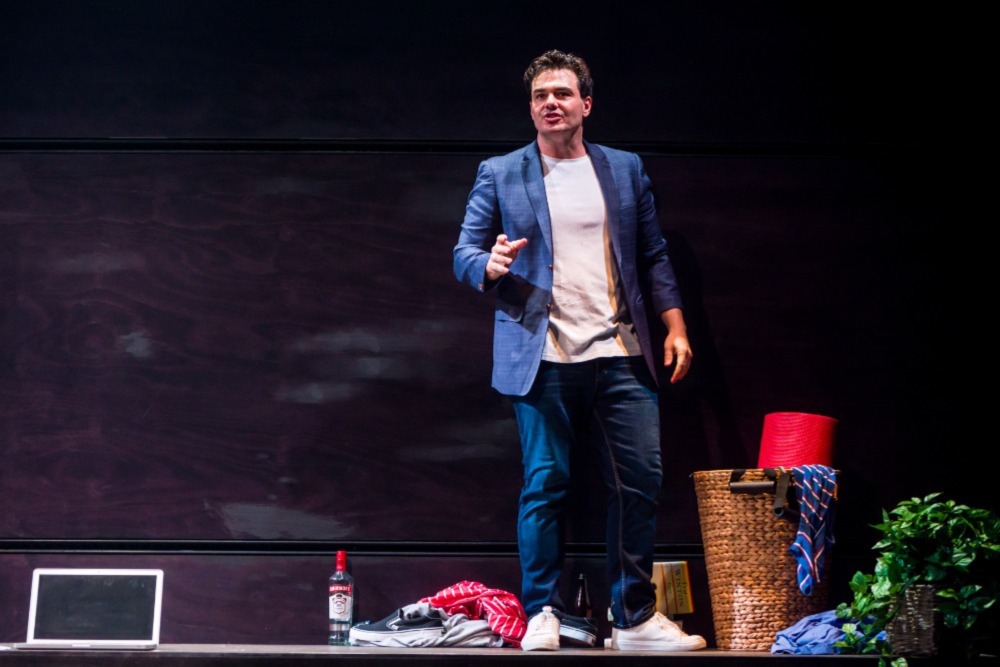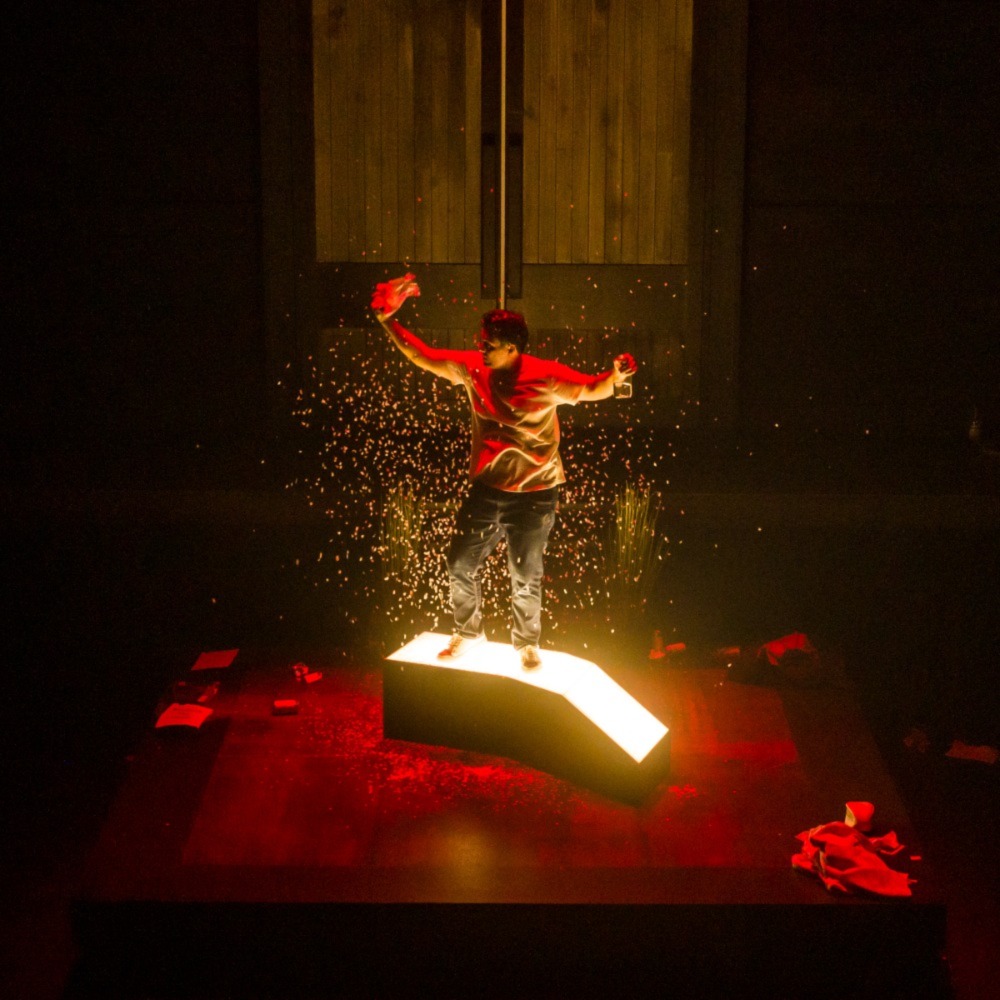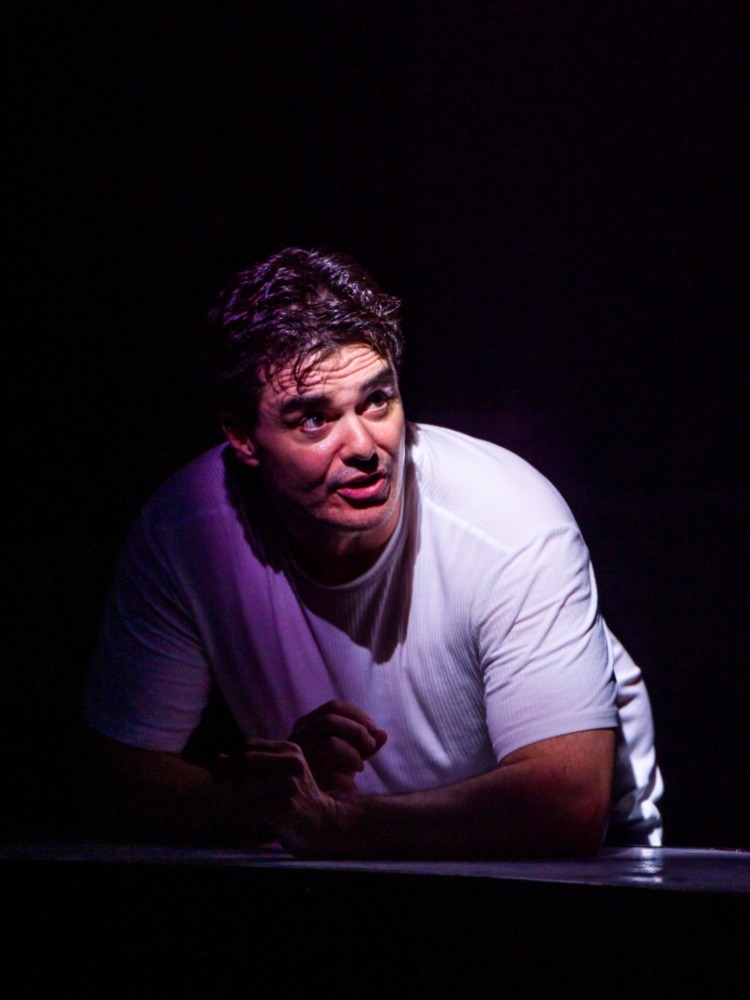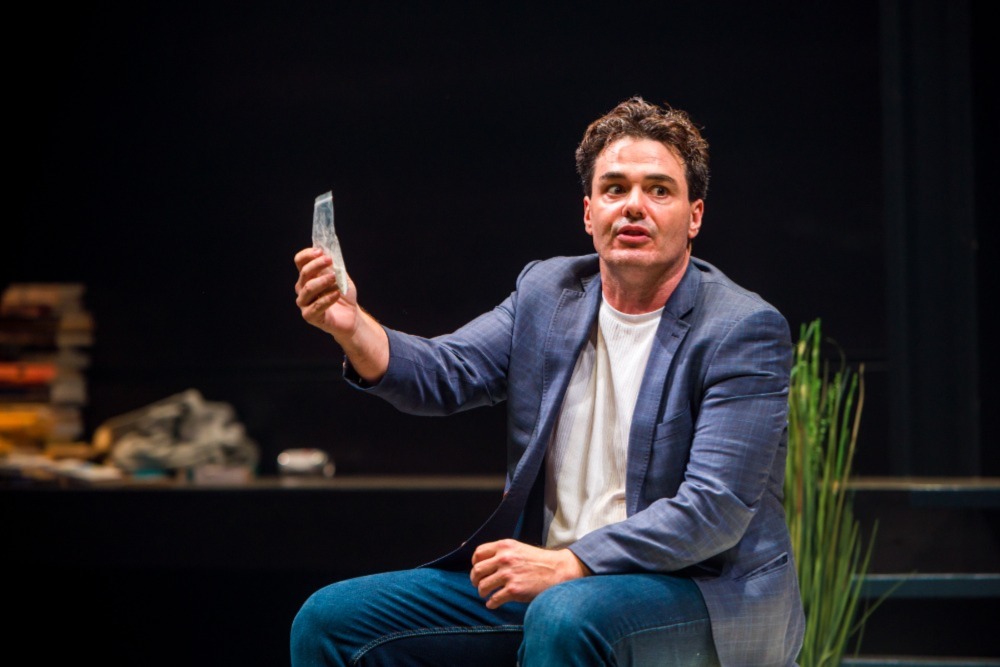Breaking the Castle | Suzannah Conway
Arts Hub, 1 March 2023
★ ★ ★ ★ ★
This extraordinary piece of writing is brought vividly to life in a one-man show by and starring Peter Cook.
Breaking the Castle was born following Peter Cook’s attendance at a script development course in Canberra, where he made the decision to write a play based on his own, some would say quite
extraordinary, life experiences.
He trained as an actor at the Victorian College of the Arts and writing was not foreign to him, as he had developed many scripts elsewhere, but Breaking the Castle was his first main play.
Developed with the support of The Street Theatre, Canberra, which subsequently produced the world premiere in 2020, the production then toured to HotHouse Theatre in Albury/Wodonga in 2021 and to Riverside Theatres in Parramatta in 2022.
This Queensland premiere is a completely new version of Breaking the Castle, with creative input from local sound, lighting and stage designers.
It has also been re-visioned with direction by the impressive Leah Purcell, whose company Oombarra Productions, with producer Bain Stewart, is a joint presenter with QPAC of this season’s new production.
The story that Cook tells is not an easy one, dealing as it does with drug addiction and mental illness. He says that he wrote the play because he is one of the few people that made it out alive after hitting rock bottom.
Having been given the opportunity for rehabilitation, he now wants to give a voice to those on the fringes of society who do not have that same opportunity. Bravely, he is also keen to face his past demons in this work and take away some of the stigma attached to addiction and mental health.
Cook stars in his one-man show, playing Dave Smith, a character who is based very much on him, but with some obvious theatrical licence.
The play is a 90-minute monologue and is extremely well constructed, moving fluidly from one scene to the next on an open set that represents variously: his home, Darlinghurst streets, a Thailand rehabilitation centre, sporting fields, audition rooms, pubs and the TAB, among other locations.
It is very well-written, energetic and punchy, with Cook playing not only Dave but a range of other characters who impact on his life in various ways.
These all have their own particular voices and accents, including his friends Johnno, a drug addict, and Frank, a recovering addict.
When he first arrives at rehab, he likens it to the United Nations and rattles off a series of first-rate accents from the US, Ireland, Eastern Europe and India, which are sharply identifiable.
The counsellor’s Cockney accent, a continuing thread in the story, is also spot on.
The show starts with Dave waiting for his cue to go on stage in an unidentified role and play, but it’s an image he comes back to time and again. One feels that being an actor, and his desire to be on stage, is often what kept Cook, and by default Dave, going through the tough times.
Another haunting image is of a huge door revealing light through the cracks, accompanied by reverberated sound, perhaps a dream, perhaps a possible way out of his addiction.
The work is variously sad and poignant, with an often wry and self-deprecating sense of humour.
It can also be hilariously funny, especially a marvellous scene where, as an out-of-work actor he is auditioning to be a cockroach in a Mortein advert, and has to die an agonising death on the floor. A scene in the TAB where he is watching the race as the commentator and encouraging his horse to win is hysterical and brilliantly delivered.
We learn through the rehab scenes, which pepper the story, that the turning point for addicts is to admit you are one. Once that hurdle is passed, then it is possible to have faith in yourself and try and turn your life around, as Dave does. The tough-skinned counsellor is all important here. There is a particularly chilling scene where Dave shows us the process involved in smoking crystal meth and the effect it has on you immediately and over the next three days.
If anything could be designed to turn a person off drugs, then this would be it.
Additionally, the most poignant episodes are around the death of his older sister from leukaemia, and a scene at six years of age hinting at sexual abuse. These slices of life are tinged with grief and heartache.
Purcell’s direction is exemplary, rhythmically weaving a cohesive path through the various scenes and establishing the character and life of Dave with great aplomb. Cook’s performance is a tour de force, as he skilfully changes direction and moods, presenting the various scenes and characters flawlessly, and thus allowing the work to flow seamlessly.
Set design by Raymond Milner, lighting by Ben Hughes and sound by DOBBY are all first-rate.
At the end of the Breaking the Castle, Dave tells us that punishing people for addiction is not the answer, as ‘the hell of addiction is punishment in itself’.
It is a sobering reminder of an illness that has afflicted so many in our society and our need to find much better ways to prevent and cure addiction and aid mental health.
This is not only a very good play, beautifully conceived, written and delivered, but it sends a strong message of hope, as well as a need for better understanding.
As Cook so eloquently puts it: ‘I wrote it to humanise people suffering with these issues and encourage a sense of compassion for those who have fallen between the cracks.’

"Purcell’s direction is exemplary, rhythmically weaving a cohesive path through the various scenes and establishing the character and life of Dave with great aplomb. Cook’s performance is a tour de force, as he skillfully changes direction and moods, presenting the various scenes and characters flawlessly, and thus allowing the work to flow seamlessly."
Suzannah Conway, Arts Hub
Theatre at its best | John Andrew
Weekend Notes, 24 February 2023
I was apprehensive about going to breaking the castle. A play about drug addiction may be worthy and meaningful no doubt but unlikely to lift ones spirits.
The set was minimalist. A black-tilted stage with an uneven centre island and littered with cigarette ends (bongs? ) bottles and sundry crumpled papers says a lot about the psyche of the occupant.
And, like the other recent tour de force monologue of personal destruction and survival Primae facie, we are to meet one actor, who in this instance is also the writer.
Peter Cook plays Dave, a down-on-his-luck actor whose drug abuse and disintegrating mental health issues are front and central to the play.
And, like Primae facie, what makes this an unforgettable experience is that through the power of peter cooks writing and acting we get to be on the inside of the trauma and the struggles.
I've tried dying he says it didnt work for me. So I suppose I've got to live.
And he spells out a number of mental deaths child sexual abuse (touched on but deflected), dysfunctional squabbling families, bereavement where the grieving does not happen, and the self-created rejections where lack of self-worth leads to anti-social behaviour which leads to more rejections.
You are a piece of shit, says a stranger. And Dave agrees. I know, he says.
The actor channels the voices of people who interact, often helplessly, with dave. One tries to encourage him by telling him how talented he is, and how much he has to offer, and what a waste he has become.
Again, Dave agrees.
We join him on a roller-coaster of mood swings, including a full-force psychotic episode, and the joy of focusing on the delicate beauty of a butterflys wings, and the panic when he experiences uncontrollable fear.
The strength of the scripting and the acting is that we are experiencing the trauma and the highs from inside rather than judging its manifestations.
And Dave reinforces that with passionate one-liners. No-one chooses to become an addict, and if you don't find the triggers you won't help the addict.
Because of the caring of a friend, Dave goes into rehab. Which is confronting as Dave works through the triggers he does not want to acknowledge, the grieving involved in managing his cravings and the realisation that he will always be an addict, but escape is possible and the struggle is endless.
A play like this reinforces the strength of theatre, when we are taken outside ourselves and step into another's shoes, live their lives, laugh their laughs, share their traumas and despair, and dare to hope.
When the lights went down, and the monologue ended, the audience rose as one for a heartfelt standing ovation.
If you only go to one play this year make this the one.

"If you only go to one play this year, make it this one."
John Andrew, Weekend Notes

Stories from the stalls| Meredith Walker
Blue Curtains Brisbane, 2 March 2023
Peter Cook’s one-man play features a number of mighty moments. The most pertinent perhaps comes with statement to its protagonist that there is power in owning your story and owning up to who you are.
The work, written and performed by Brisbane’s Cook is inspired by true events, and its protagonist, David, played by Cook himself, is based very much on him.
David is a struggling actor, never quite good enough, battling debilitating mental health, and descending into drug and alcohol abuse. That is until he is thrown an unlikely lifeline and offered a chance at redemption in a rehabilitation centre in Thailand.
It is not an easy story, considering, as
it does, issues around drug addiction and mental illness, but it is a well-told one.
The well-crafted tale is bravely shared like a 90-minute monologue, inset with play-out of a variety of scenes and characters all played by Cook, with choices of physicality and accents working well to differentiate
as much as establish individual characters.
Without missing a beat, even in quick back and forth conversation between his portrayal of distinctly different characters, Cook not only humanises his protagonist through articulated dramatisation of his dilemmas, but shares as to his inner critic thoughts, around the shame attached to the stigma of addiction and lack of connection apart from
when on-stage.
There is a real honesty to a story that could easily have emerged as a clichéd take on its subject matter as David loses control while attempting to convince himself of justification for each day’s substance abuse, however, its lived experience authenticity ensures that this is never the case.
Rather, as David begins to reveal his feelings to a tough-love counsellor rather than in ritual group rehab situations, the work is entirely compelling.
A metatheatre touch to early scenes see David telling of his passion for acting and love of the feeling of being on stage, alongside recollection of pre-rehab life getting-on in Kings Cross, recalling its rituals and the feelings it engenders. It’s a vital framing device, given art’s essential role in facilitating consideration of big ideas around what it means to be human, and it reflects the
craftedness of themes and motifs that are interwoven through the work.
The steady direction of internationally acclaimed theatre-maker Leah Purcell AM, also serves to ensure a seamless flow between the play’s humorous and heartfelt sensibilities.
Design features humanise its ultimate themes, especially as we are granted glimpses into David’s childhood and Ben Hughes’s lighting design both heralds some haunting imagery as light cracks into David’s darkness and sparkles things towards revelation of the work’s otherwise enigmatic title, in a
culmination of its slow reveal as elements jigsaw together before our eyes before we even catch on that they are doing so.
Breaking the Castle is a journey of a story, in sensibility too as in some of its funniest moments, Cook hilariously recalls humiliations at the hands of casting directors, finding the humour even in a meth bender as David urges along horses in a race upon which he has placed a bet.
The show is built upon its well-written script, which easily slips between language tones as much as thematic moods, and by we make it to its profound final moments, it is easy to appreciate its three critically acclaimed interstate seasons ahead of its Brisbane homecoming.
Despite its undeniable comedy, there’s no getting away from the earnestness that underlies it as a moving play about being human and looking for the humanity in others.
And it is this that provokes the conversation that follows on from the audience members’ united rise to their feet in acclaim, for as Purcell notes in the show’s program, “it is one man’s experience, but we can all take something away from witnessing this work”.
"The steady direction of internationally acclaimed theatre-maker Leah Purcell AM, also serves to ensure a seamless flow between the play’s humorous and heartfelt sensibilities."
Meredith Walker, Blue Curtains, Brisbane

